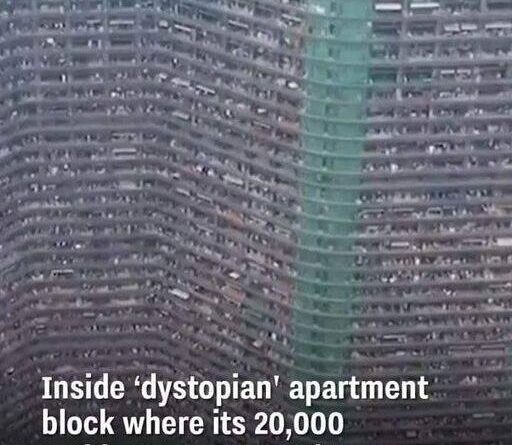Inside a ‘Dystopian’ apartment block where that houses over 20,000 residence.
In a captivating TikTok video, @fatheristheone unveiled the awe-inspiring “Dystopian Apartment,” a colossal structure in China designed to house 30,000 residents. Using a drone, the video showcased not only the remarkable interior and unique architectural features but also the sheer scale of the building, leaving viewers astonished.
While many are familiar with the concept of a dystopian society from novels depicting societies plagued by fear or lacking in humanity, the reality of such a massive residential complex in China now challenges imagination. Situated in Qianjiang Century City, Hangzhou, the Regent International apartment complex, designed by Alicia Loo, rises 675 feet tall, accommodating around 20,000 residents since its completion in 2013. Its distinctive S-shaped design spans either 36 or 39 floors, making it one of the most densely populated areas globally.
Within the Regent International, over 30 floors host an array of amenities, from restaurants and pools to grocery stores and internet cafes, providing residents with a self-contained living environment often dubbed a “dystopian apartment.” Despite concerns about confinement, the majority of residents—comprising young professionals, influencers, and college students—choose to reside here for its affordability and convenience rather than being coerced into a dystopian existence.
Living in the Regent International offers unparalleled convenience, with all essential services available under one roof. Units, ranging from 1,500 RMB to 4,000 RMB per month, cater to diverse needs and budgets. While some express reservations about its dystopian connotations, others laud its innovative design, even heralding it as the epitome of sustainable living.
In light of the housing crisis in the U.S., the concept of a “dystopian apartment” presents a unique solution to expanding living spaces without consuming vast tracts of land. Notably, Whittier, Alaska, has embraced a similar model with a 14-story building housing all 272 residents, offering amenities akin to those in China.
However, despite its advantages, concerns linger regarding privacy and limited outdoor access, contrasting with American preferences. Yet, options such as larger units with balconies at the Regent International provide some respite from the perceived drawbacks, offering individuals the opportunity to adapt to communal living in innovative ways.
Would you consider residing in such a place? Share your thoughts in the comments below!

